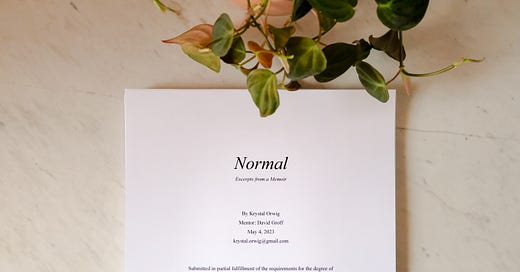Memoir Musing: A little pep talk about slow progress on your memoir
And where I'm at in my own journey.
Announcements:
The next silent write-in will take place tomorrow at 11 AM. Reminder that August write-ins are open to ALL subscribers — Zoom link will be sent in the morning.
The August reading series also takes place tomorrow night at 7:30 PM. Come out to Jake’s Dilemma to hear some amazing nonfiction readers! All the details here.
For this week’s Memoir musing, I want to talk about progress, or what sometimes feels like no progress, in writing our memoirs. There was a time, not that long ago, that I would never have believed how long it takes most memoirists to finish their books. I naively assumed that you just had to sit your butt in a chair and out it would come. Of course I was devastated to find out that it actually takes a lot more work than that.
As many nonfiction writers do, I came to the memoir genre through several failed attempts to write fiction. But because my first introduction to it was Cheryl Strayed’s Wild, I thought perhaps a writer needed to do something just as bold and scary as hiking the Pacific Crest Trail alone to merit writing an entire book about their experience. Then I found Mary Karr and never looked back.
Once I realized I didn't have to write fiction, writing poured out of me, as I worked my way through experiences that hovered just under the surface, memories I could easily access. It wasn’t all good writing — to be honest most of it was shit. But it felt right to be using real-life in my writing, finally giving me the parameters I needed to keep myself focused.
It didn’t take long, however, for writing to feel hard again. This time for different reasons. Once I got out all the crappy early writing that is mandated when you’re starting out, I realized I needed to go so much deeper—finding meaning that could relate to an audience. I needed to craft a story that was rich in character and setting and reflection, and I needed to identify where all that was in my own story. Which takes SO. MUCH. TIME.
During graduate school, I got out something like 60,000 words of messy, unruly writing that I have hesitated to call a manuscript since I’ve graduated. There was no order I was writing in, nothing that resembled a full chapter, and so many threads lying around I was tempted to take up sewing as a hobby instead.
I also spent my thesis semester conducting family research, as I mentioned in my last musings post, and finding out new information as I was writing—which was constantly getting in the way of the prose I’d already cobbled together. I was learning information that contradicted stuff I’d already written and shocking developments that had me questioning how I felt about people and circumstances in my life that I had already wrote down on the virtual paper screen.
Basically, I was (am) a person who is still growing and learning, and trying to get my narrator to catch up with where I am is an ongoing task. What my thesis mentor, David Groff, encouraged me to do as I approached graduation, was think about everything I’d written as excerpts of a memoir, without forcing it to be something it wasn’t ready to be yet. It was great advice at the time, and when I turned in my thesis, I celebrated getting my MFA and took a much-needed break from writing.
This summer, when I renewed my writing contract with Hope, I set my main goal to REALLY start revising my work into some version of a first draft. It was something I’d been putting off for over a year and I felt guilty about it regularly. I often checked in with a section here and there, and even polished a few to share at Must Love Memoir readings, but I avoided the hard work of figuring out how all the sections could fit together.
After a month of my contractual obligation of writing/revising 5,000 words per week, I finally have the first six chapters in what is a real beginning that I am proud to call a “draft”. That might not seem like a lot of chapters to you or even something worth celebrating, but it feels like the right amount of progress for me. Because I am finally accepting that the progress is not only allowed to be slow, it’s usually expected for this kind of writing and this kind of project.
I want to encourage you to give yourself the time and space to do this work in a way that feels good (or as good as it can feel when you’re ripping yourself open on the page). I had to step away and listen to what story was actually begging to be told. I know for me, I still had a lot of processing to do before I could make sense of my feelings and therefore everything I had written. I still have a lot of work to do, but it feels like I’m ready to conquer this part of the writing process.
A few weeks ago, I submitted a few of the chapters to my writing group and received a lot of encouraging feedback that’s motivating me to keep going. I still have a long way to go to make my way to a first full draft, and you better believe I will celebrate the hell out of that when it’s finished. But after a year of being paralyzed at the thought of reworking everything I’d composed over the last five years, it feels good to be excited about the process again.







